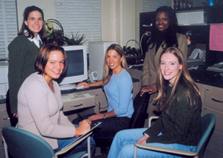What is Dietetics?
An academic program that prepares students to use advanced knowledge about food and nutrition to help prevent and treat disease and maintain and promote health. It is...
- People-oriented and science-focused
- Evidence-based
- The first step toward a professional credential
Dietetics at Michigan State University
- One of the largest dietetics programs in the United States
- Meets didactic program requirements as approved by the Accreditation Council For Education in Nutrition and Dietetics (ACEND)*
- Excellent academic scholarships, study abroad scholarships, and research scholarships within the program in addition to other financial aid opportunities - learn more
What is a Registered Dietitian?
Registered Dietitian (RD) -- or, the newer term, Registered Dietitian Nutritionist (RDN) -- is a professional title and credential used by individuals who have completed the following steps:
- Earn a degree from an accredited dietetics program. This is typically earned through a bachelor's degree in dietetics. For those who decide on a career in dietetics after earning their bachelor’s degree, an accredited master’s dietetics program is also an option (a Coordinated Program or Graduate Program).
- Complete a supervised practice requirement. Individuals must complete at least 1,000 hours of supervised practice.
- Earn a master’s degree.
- Pass the national registration examination for dietitians. After the previous steps are complete, you may take CDR's Registration Examination to become credentialed as a registered dietitian nutritionist.
Video: Exploring a Career in Dietetics
Is Licensure required to practice as a registered dietitian?
Currently Michigan does not require licensure, but most other states do require it. Therefore, if you become a registered dietitian and decide to reside or move to a state requiring licensure, you will need to complete the state specific licensure requirements in order to practice.
Please follow this link for more information about licensure.
Career Opportunities as a Registered Dietitian

Perhaps the largest number of dietitians work in clinical practice -- such as in a hospital or extended care facility. Many also work in a community health setting, such as at a health department, often in programs for at-risk populations, such as WIC (Women, Infants, Children), Head Start, or programs for seniors. Some dietitians' responsibilities are concentrated in the foodservice operations where dietary modifications may be necessary. Here are some areas of focus:
- Clinical nutrition practice
- Public health nutrition
- Corporate wellness/health promotion
- Higher education
- Food industry
- Foodservice management
- Private practice/nutritional counseling
Earning a bachelor’s degree in dietetics from an accredited program also qualifies students to become a nutrition and dietetic technician, registered (NDTR). A master’s degree is not required to practice as a NDTR. Upon earning a degree in dietetics, students may take CDR's Registration Examination for Dietetic Technicians to become credentialed as a NDTR. More information about this career path can be found on the Academy website: Become a Nutrition and Dietetics Technician, Registered (eatright.org)
Accreditation Council for Education in Nutrition and Dietetics, Academy of Nutrition and Dietetics, 120 South Riverside Plaza, Suite 2000, Chicago, IL 60606-6995; (312) 899-0400 ext. 5400; acend@eatright.org
Contact the adviser:
Jill DeJager
Department of Food Science and Human Nutrition
G. M. Trout FSHN Building
469 Wilson Road, room 106C
East Lansing, MI 48824-1224
Phone: (517) 353-3322
Fax: (517) 353-8963
E-mail: dejagerj@msu.edu



 Print
Print Email
Email